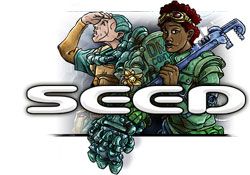Retro Replay Review
Gameplay
Seed’s gameplay sets itself apart by eschewing traditional combat mechanics in favor of a rich, cooperative experience. As a newly hatched colonist, you’ll spend your time performing essential maintenance tasks, repairing malfunctioning life support systems, and managing scarce resources to ensure the survival of the entire community. The point-and-click interface is intuitive, allowing you to quickly interact with equipment panels, inspect broken machinery, and allocate your time efficiently between tasks.
(HEY YOU!! We hope you enjoy! We try not to run ads. So basically, this is a very expensive hobby running this site. Please consider joining us for updates, forums, and more. Network w/ us to make some cash or friends while retro gaming, and you can win some free retro games for posting. Okay, carry on 👍)
Progression in Seed revolves around honing your engineering skills and forming alliances with fellow colonists. There are no linear quest lines; instead, you’ll tackle “stories” — narrative-driven objectives handed out by NPC administrators or crafted by players themselves. Whether you’re troubleshooting a failing oxygen generator or implementing a new solar array under time pressure, each story offers a dynamic challenge that encourages creative problem-solving and close communication with teammates.
Politics play a surprisingly prominent role, as decisions made by the colony’s council can shape research priorities and resource distribution. You might lobby for increased bio-dome funding, negotiate with rival factions over mining rights, or serve as a mediator during high-stakes debates. This emergent governance system keeps you invested in both the day-to-day operations and the broader trajectory of the colony, ensuring that your contributions have meaningful consequences.
Graphics
Seed’s visuals adopt a distinctive cel-shaded art style that immediately evokes the feel of a science-fiction comic book. The bright edges and flat color palettes give each environment a stylized clarity, making it easy to distinguish between critical interactive elements and background scenery. This approach not only lends character to the world but also helps maintain high frame rates, even during large-scale cooperative events.
The planet’s evolving landscapes—from half-constructed terraforming domes to windswept red plains—are rendered with clean lines and bold contrasts, ensuring that every structure and piece of machinery stands out. Subtle environmental effects, like drifting dust particles and shifting weather patterns, add a layer of immersion without overwhelming the visual aesthetic. Combined with dynamic lighting that responds to power fluctuations and day-night cycles, the graphics reinforce the sense of a living, breathing colony on the brink.
Character models feature crisp animations and expressive gestures that bring each colonist to life. Whether you’re repairing a conduit or presenting a research proposal, your avatar’s motions are fluid and readable. The UI is seamlessly integrated into the world, with holographic overlays and transparent status panels that feel like natural extensions of the colony’s computer system rather than intrusive menus. Overall, the art direction strikes a confident balance between style and functionality.
Story
At its core, Seed tells a story of resilience and adaptation. After terraforming efforts backfire and the colony tower begins to crumble, an onboard AI makes a bold decision: hatch 100 humans to salvage the mission. This premise sets the stage for a narrative where every colonist’s ingenuity becomes critical to survival. The overarching plot is delivered through environmental storytelling, AI broadcasts, and the collective experiences of players as they navigate crises.
Rather than funneling you through a predetermined storyline, Seed empowers players to create their own narratives. “Stories” function like personalized quests that can range from intense emergency drills to diplomatic summits in the council chamber. The AI overseer occasionally injects major plot events—such as a sudden core breach or a mysterious parasite outbreak—forcing the community to adapt rapidly. These inflection points offer high-stakes drama and foster memorable cooperative moments.
Interpersonal dynamics are equally compelling. As you interact with other colonists, you’ll forge alliances, reveal hidden agendas, and even face moral dilemmas about resource allocation and existential risk. The absence of combat means that conflicts are settled through debate, negotiation, and technical ingenuity, giving Seed a thoughtful narrative rhythm that highlights the human element of colonization. Every choice you make—big or small—affects both the colony’s fate and the evolving legend of these first hundred settlers.
Overall Experience
Seed delivers a refreshingly cerebral take on the MMORPG genre. Its emphasis on collaboration, engineering challenges, and political maneuvering creates a uniquely social experience that rewards communication and creativity. Stepping into this world feels less like grinding for loot and more like contributing to a grand, communal project with real stakes.
The learning curve can be steep, especially if you’re new to non-combat MMOs, but the community is generally welcoming and eager to assist. Veteran colonists often host training sessions, share custom “stories,” and coordinate large-scale operations, making it easy to find a role that fits your interests—whether that’s leading council meetings, mastering advanced terraforming protocols, or running supply logistics.
While Seed’s focus on non-violent gameplay and emergent storytelling may not appeal to players seeking fast-paced action, it excels as an immersive sandbox for cooperative problem-solving. The combination of cel-shaded aesthetics, dynamic narrative events, and meaningful political systems ensures that no two play sessions feel identical. For gamers intrigued by the concept of building a society from the ground up, Seed offers an experience that is both challenging and deeply rewarding.
 Retro Replay Retro Replay gaming reviews, news, emulation, geek stuff and more!
Retro Replay Retro Replay gaming reviews, news, emulation, geek stuff and more!




Reviews
There are no reviews yet.